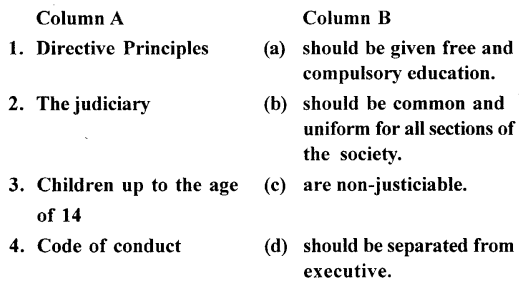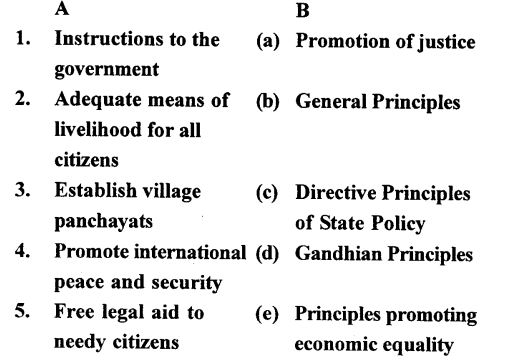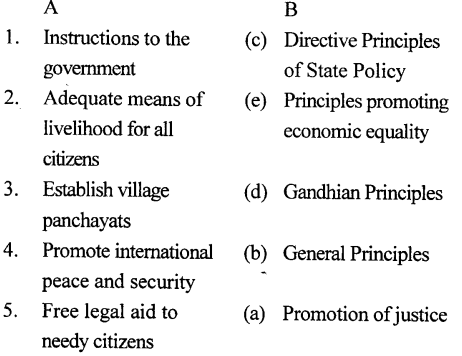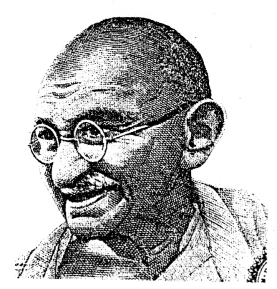ICSE Solutions for Class 7 History and Civics – Directive Principles of State Policy
ICSE SolutionsSelina ICSE SolutionsML Aggarwal Solutions
APlusTopper.com provides step by step solutions for ICSE Solutions for Class 7 History and Civics. You can download the History and Civics ICSE Solutions for Class 7 with Free PDF download option. History and Civics for Class 7 ICSE Solutions all questions are solved and explained by expert teachers as per ICSE board guidelines.
ICSE Solutions Class 7 History & CivicsGeographyMathsPhysicsChemistryBiology
Important Words
- Welfare state is a country where citizens are guaranteed a . healthy standard of living, equal opportunities, full employment and a fair distribution of wealth. Every citizen enjoys social and economic justice in a welfare state.
- Directive Principles of State Policy are guidelines which all governments are expected to follow while making and implementing policies and programmes for the welfare of the people.
- Special needs are needs that a person has because of mental or physical problems.
I. Time To Learn
Fill in the blanks:
- Directive Principles are given in part IV of the Constitution of India.
- The state shall endeavour to provide employment to every individual, is a Directive Principle concerned with Economic Equality.
- The state shall work for the separation of the executive and judicial powers, is a Directive Principle concerned with administration.
- Uniform system of civil and criminal laws in the country, is a Directive Principle under the law and justice.
- There should be prohibition as to the use of intoxicating drinks and other drugs, is a Directive Principle concerned with principles relating to social equality and educational upliftment.
II. Match the contents of Column A with those of Column B:

Answer:


III. Tick mark (✓) the correct statements ami cross mark (X) the wrong ones:
- That the institution of the Panchayati Raj is one of the Directive Principles related to Economic Equality.
X - That the state shall protect ancient monuments, is one of the Directive Principles pertaining to Social Equality and Educational Uplift.
X - That the state shall ensure equal pay for equal work, is one of the Directive Principles relating to Economic Equality.
X - That the state shall always favour and encourage international peace and security through diplomatic channels, is a Directive Principle of administrative importance.
X - Directive Principles get protection from the law courts
X
IV. Answer the following questions:
Question 1.
What are “Directive Principles”? Why can Directive Principles not be ignored by a government even though they are not justiciable?
Answer:
Directive Principles: The ‘Directive Principle of State Policy’ are ‘guidelines’ or ‘directives’ given by the Constitution to the central and state governments to adopt such policies as to improve the condition of their countrymen. If these principles are followed, a welfare state which ensures justice, liberty and equality can be established. The Directive Principles are not justiciable because we cannot take recourse to law for their implementation. They do have a moral sanctioin behind them but not a legal one. If the Fundamental Rights of a person are violated, he has a right to move the court. The Directive Principles have no legal remedies.
Question 2.
Why are Directive Principles important? Mention any five Directive Principles.
Answer:
Directive Principles of State Policy aim to create social and economic conditions under which the citizens can lead a good life. They also aim to establish social and economic democracy through a welfare state.
The Directive Principles are as follows:
- Principle relating to Economic Equality.
- Principles relating to social Equality and Educational Uplift.
- Principle Relating to Law, Justice and Administration.
- Principles for International Peace.
- Miscellaneous Principles.
Question 3.
Which Directive Principles relate to the establishment of a socialist society?
Answer:
The Directive Principles related to the establishment of a socialist society is Principles relating to Economic Equality.
Question 4.
Which directive Principle concerns the Scheduled Castes and Scheduled Tribes?
Answer:
Reserved posts and reservation for political seats and fee concessions have been given to Sheduled Castes and Scheduled Tribes by the Government of India.
Question 5.
How do the Directive Principles of State Policy seek to promote internationalism?
Answer:
Principles for international peace:
The state should conduct its foreign affairs in such a way that friendly and cordial relations are established with all the countries of the world.
Special efforts should be made to foster respect for international law.
The state shall always favour and encourage international peace and security through diplomatic channels.
Question 6.
What is the difference between the Fundamental Rights and the Directive Principles of State Policy?
Answer:
Difference between the Fundamental Rights and the Directive Principles of State Policy:
Fundamental Rights
- They are justiciable by law. A person can go to the Supreme Court, High Court or any other court if his right has been violated.
- Their aim is to established political democracy.
- Some of our fundamental rights can be suspended during emergency.
Direct Principles of State policy
- They are not justiciable.lt no legal remedies. One can not take recourse to law their implementation.
- Their aim is to give economic and social
- Directive Principles of the state policy cannot be suspended.
V. Write short notes on the following:
Question 1.
Principles relating to economic equality.
Answer:
These relate to the establishment of a socialist society:
- The government should strive to reduce inequalities in income so that wealth is not concentrated in the hands of a few people.
- There should be no discrimination between men and women, as regards their education and employment. Men and women should get equal pay for equal work.
- The working conditions in mills, factories, offices etc. should be such that the workers do no suffer hardship. Economic and moral exploitation of infants and children should be stopped by the state.
Question 2.
Principles pertaining to social equality and educational uplift.
Answer:
These principles are also referred to as Gandhian Principles:
- There should be compulsory and free education for all children up to the age of 14.
- There should also be free medical aid for all sections of society.
- The state shall put an end of exploitation of the Scheduled Castes and Scheduled Tribes and all other socially as well as economically backward sections of the society.
- There should be prohibition as to the use of intoxicating drinks (wine) and other drugs.
- The state shall devise, as far as possible, a common and uniform code of conduct for all sections of the society.
Question 3.
Directive Principles help in the success of a democratic government?
Answer:
Directive Principles help in the success of a democratic government as their basic aim is to persuade the government to provide social and economic justice in all spheres of life, keeping in view its limited material resources, at the earliest possible. Many of them have been implemented very successfully. Actually, no government can afford to ignore these instructions as they are the mirror of the public opinion and also reflect the basic spirit of the Preamble of our Constitution.
Additional Questions
(Directive Principles of State Policy)
A. Fill in the blanks:
- The guidelines which all governments are expected to follow for the welfare of the people are known as Directive Principles of State Policy.
- The Directive Principles contain a list of important and basic economic and social rights which the farmers of the Constitution wanted every Indian to enjoy.
- To establish economic equality in the country, the government is directed to ensure a fair and equal distribution of the wealth and material resources of the country.
- The government is directed to promote cottage industries in villages and prohibit the slaughter of cows and other cattle according to the Gandhian principles.
- Free and compulsory education for all children between 6 and 14 years has been made a Fundamental Right.
B. Match the following:

Answer:

C. Choose the correct answer:
1. After 200 years of foreign rule, the Indian economy was strong/stable/ruined.
Ans. After 200 years of foreign rule, the Indian economy was ruined.
2. The Directive Principles can be classified into three/ four/five
Ans. The Directive Principles can be classified into three categories.
3. Some of the ideas of R. Ambedkar/Jawaharlal Nehru/Mahatma Gandhi were included as Directive Principles.
Ans. Some of the ideas of Mahatma Gandhi were included as Directive Principles.
4. One of the Gandhian Principles/General Principles/ Principles promoting economic equality directs the government to prevent the consumption of liquor.
Ans. One of the Gandhian Principles directs the government to prevent the consumption of liquor.
5. The Directive Principles ask the government to provide free legal aid/economic help/housing.
Ans. The Directive Principles ask the government to provide free legal aid.
D. State whether the following are true or false:
- The farmers of our Constitution had a dream of a welfare state.
True. - The provision of free and compulsory education to all children up to the age of 14 is a General Principle.
False. - The Fundamental Rights and Directive Principles of State Policy do not have the same purpose.
False - If you are deprived of your Fundamental Rights, you
True - can go to the High Court or the Supreme Court to seek protection and enforcement of your rights.
True. - India has achieved the goal of a Welfare State.
False.
E. Answer the following questions in one or two words/ sentences:
Question 1.
Define a welfare state?
Answer:
Welfare State is a country where citizens are guaranted a healthy standard of living, equal opportunities, full employment, fair distribution of wealth and they also enjoy social and economic justice.
Question 2.
What are Directive Principles of State Policy?
Answer:
In the Constitution there are certain guidelines which the central, state and local governments are expected to follow while making and implementing policies and programmes for the welfare of the people, these guidelines are known as Directive Principles of State Policy.
Question 3.
Mention the categories into which Directive Principles can be, classified.
Answer:
Directive Principles can be broadly classified into three categories:
- Principles promoting economic equality
- Gandhian Principles promoting economic and social development.
- General Principles.
Question 4.
Mention any one Directive Principle that seeks to promote economic equality between men and women.
Answer:
- There should be a fair and equal distribution of wealth and material resources of the country.
- There should be equal pay for equal work, for both men and women.
Question 5.
What is the significance of the Right to Education Act of 2009?
Answer:
The Right to Education Act of 2009 (Article 21A of the Constitution) makes education a Fundamental Right of every Indian child between the ages of 6 and 14 years. It requires all privately owned schools to reserve 25 per cent of seats for children from poor families.
Question 6.
Why can you not seek justice in a court of law if the government does not give you a job?
Answer:
Directive Principles, on the other hand, are non-justiciable, if you do not get a job or proper wages, you cannot go to a court to seek justice.
F. Answer the following questions briefly:
Question 1.
Why did the farmers of the Constitution not establish a welfare state in India in 1949? What steps did they take to help future governments to achieve the goal of a welfare state?
Answer:
The farmers of our Constitution had a dream of a welfare state. A welfare state is a country where citizens are guaranteed a healthy standard of living, equal opportunities, full employment and a fair distribution of wealth. The farmers of the Constitution, however, could not fulfil this dream in 1949. Our country had just been freed from 200 years of foreign rule which had ruined India’s economy. So they laid down certain guidelines in the Constitution for all future governments to follow.
Question 2.
State one Directive Principle with regard to each of the following: (a) wealth and material resources (b) weaker sections of society (c) foreign affairs.
Answer:
(a) Wealth and material resources: Fair and equitable distribution of wealth and material resources of the country. The resources of the country should be used for the common good of all.
(b) Weaker sections of society: A living wage for every worker, e., a wage which will enable a person to buy basic necessities.
(c) Foreign policy:
- Promote international peace and security.
- Maintain just and honourable relations with other countries.
Question 3.
Mention two Directive Principles with reference to each of the following:
(a) Development of villages (b) Health
Answer:
(a) Development of villages:
- Establish village panchayats.
- Modernize agriculture and animal husbandry.
(b) Health:
- Improve the level of nutrition and general health of the people.
- Prevent consumption of liquor and other harmful drugs.
Question 4.
Mention the category under which the following principles are classified:
(a) a decent standard of living and leisure (b) prevention of the slaughter of cows and other cattle (c) protection of the environment.
Answer:
(a) Economic equality.
(b) Gandhian Principles.
(c) General Principles.
Question 5.
Compare and contrast the Fundamental Rights and Directive Principles of State Policy.
Answer:
Fundamental Rights are justiciable, i.e., – if people are deprived of their Fundamental Rights, they can go to the Court to seek protection and enforcement of their rights. Directive Principles, on the other hand, are non justiciable, i.e., if.you do not get a job or proper wages you cannot go to a court to seek justice.
Question 6.
Briefly discuss the efforts made by various governments to implement the Directive Principles of State Policy.
Answer:
Various steps have been taken by all governments to implement Directive Principles like-free and compulsory education is provided to all the children between six to fourteen years. Welfare schemes for the Scheduled castes and Scheduled tribes are implemented. Various employment schemes have been launched and a law is passed which guarantees equal pay for both men and women.
G Picture study:
This is the picture of the Father of our Nation, who championed the cause of the poor and downtrodden people in India.

Question 1.
Identify the person in the picture.
Answer:
Father of our nation Mahatama Gandhi
Question 2.
Mention any two of his ideas that were included in the Directive Principles of State Policy.
Answer:
- Provide free and compulsory educations for all children up to the age of 14.
- Promote cottage industries in villages.
Question 3.
What does the term Directive Principles of State Policy mean?
Answer:
Directive Principles of State Policy are guidelines which all government are expected to follow while and programmes for the welfare of the people.
Question 4.
Mention one important difference between Fundamental Rights and Directive Principles.
Answer:
An important difference between them is that the Fundamental Rights are justiciable, i.e., if people are deprived of their Fundamental Rights, they can go to the Court to seek protection and enforcement of their rights. Directive Principles, on the other hand, are non-justiciable, i.e., if you do not get a job or proper wages, you cannot go to a court to seek justice.